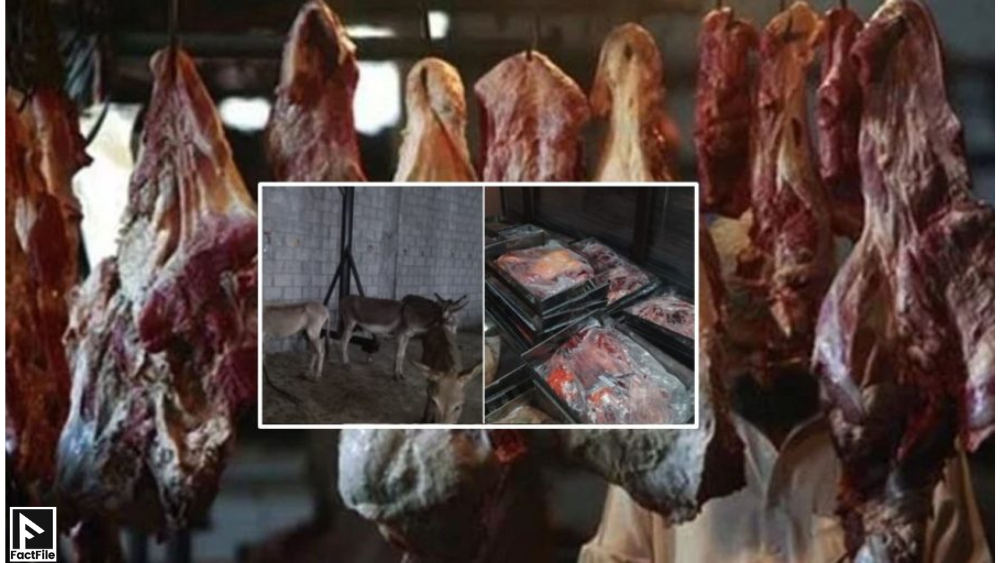In a major crackdown, the Islamabad Food Authority (IFA) seized over 900 kilograms of donkey meat during a targeted raid in Tarnol, a suburb of the capital. The operation is part of an ongoing effort to fight illegal meat trade and safeguard public health.
Authorities uncovered 25 maunds (over 900 kg) of donkey meat inside a facility on the outskirts of Islamabad. They also found more than 50 live donkeys, likely kept for illegal slaughter. Officials acted on intelligence reports and took swift action to prevent the meat from entering the market.
Donkey Meat Meant for Export
Early findings revealed that the seized meat was not for local sale. Instead, it was being prepared for export to other countries, raising serious concerns about cross-border food crimes. During the raid, officials arrested a foreign national who was present at the facility. He was immediately handed over to local police and is now under investigation.
The IFA confirmed that their teams followed strict procedures to safely destroy the recovered meat. This move prevented any possibility of it reaching consumers.
Legal Action and Investigation in Progress
Law enforcement has registered a criminal case against the individuals involved. Investigators are now working to uncover the entire supply chain, including buyers, handlers, and export partners. The arrest of a foreign national suggests the involvement of an organized international network.
An IFA spokesperson stated, “We are committed to breaking these illegal networks. Anyone endangering public health for profit will face strict consequences.”
Public Urged to Be Cautious
The authorities urged citizens to buy meat only from licensed and verified shops. They also recommended looking for official seals and avoiding roadside vendors who do not meet hygiene or safety standards.
Officials encouraged people to:
- Demand proper receipts when buying meat
- Report suspicious activities to food safety helplines
- Stay informed through official food safety updates
“We can stop illegal meat trade only with the public’s help,” an IFA representative added. “Awareness and caution are key.”
Growing Public Concern
News of the raid has spread quickly on social media. Many residents of Islamabad expressed outrage and concern over the safety of meat sold in markets. The idea that such large-scale operations can run unnoticed shocked many.
Sana Ahmed, a resident of G-11, shared her thoughts: “This is horrifying. We trust local shops and restaurants, but this makes you think twice. Authorities must act fast and set an example.”
Part of a Larger Food Safety Drive
This raid is not an isolated effort. It is part of a wider campaign by the government to ensure food safety in the capital and across Pakistan. The IFA plans to conduct more surprise inspections in the coming days, especially in areas suspected of illegal activity.
The campaign includes:
- Random checks at butcher shops
- Crackdowns on unregistered slaughterhouses
- Lab testing of meat samples from open markets
The government aims to restore public trust and eliminate unsafe food practices. Officials have promised swift justice for those involved in illegal trade.
Health Hazards of Donkey Meat
Veterinary experts warn that donkey meat is unfit for human consumption, especially when processed without proper sanitation. Consuming it can lead to bacterial infections, stomach issues, and long-term illnesses. Illegally slaughtered meat also carries risks of parasites and foodborne diseases.
Unfortunately, this is not the first case. Similar incidents have been reported in Lahore, Karachi, and Faisalabad, where donkey meat was disguised as beef or mixed into kebabs, curries, and other local dishes.
What Comes Next?
Authorities are expanding their investigation to trace the entire network involved in the trade. This includes identifying where the meat was being exported and who was funding the operation.
The IFA, alongside police and health departments, is developing a central monitoring system for meat vendors and slaughterhouses. This system will help flag irregular activity and improve inspection coverage across urban and rural areas.
READ MORE: New Drug Turns Human Blood into Mosquito Killer
A Wake-Up Call for Pakistan
The recovery of 900 kg donkey meat from Islamabad is a serious reminder of the gaps in food monitoring. It also highlights the need for better public education, regulatory enforcement, and legal reform.
The government must now deliver on its promises. Citizens, too, must remain alert and report illegal practices when seen. Only with joint efforts can we ensure clean, halal, and safe food for all.

























